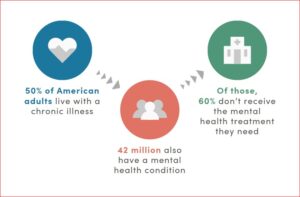Anxiety is more than a mental health concern; it can significantly impact physical well-being, leading to a complex interplay between mental and physical health. Research has unveiled a profound connection between anxiety and various chronic health conditions. Understanding this relationship is crucial for a holistic approach to health care, as addressing anxiety could potentially mitigate the impact of these chronic illnesses. 
The Interwoven Nature of Anxiety and Chronic Health Conditions:
Anxiety and chronic health conditions often exist in a bidirectional relationship, influencing and exacerbating one another. Studies have shown that individuals with anxiety disorders are at a higher risk of developing chronic health issues, and those with chronic illnesses are more susceptible to experiencing anxiety symptoms.
- Cardiovascular Diseases: Anxiety has been linked to an increased risk of cardiovascular diseases such as heart disease and hypertension. The stress response associated with anxiety can elevate blood pressure and contribute to the development or worsening of heart conditions.
- Gastrointestinal Disorders: Conditions like irritable bowel syndrome (IBS) and other gastrointestinal issues often co-occur with anxiety. The gut-brain connection plays a significant role in these associations.
- Respiratory Conditions: Anxiety can exacerbate respiratory problems such as asthma. Stress and anxiety may trigger or worsen asthma symptoms, making management more challenging.
- Chronic Pain Conditions: Anxiety amplifies the perception of pain and is commonly seen in individuals suffering from chronic pain conditions like fibromyalgia or arthritis.
Mechanisms Behind the Connection:
The mechanisms linking anxiety and chronic health conditions are multifaceted:
- Stress Response: Chronic stress, a common feature of anxiety, can negatively impact the immune system and increase inflammation, which, in turn, can exacerbate chronic health conditions.
- Behavioral Factors: Anxiety often leads to behaviors that may worsen health outcomes, such as poor sleep, lack of physical activity, and unhealthy eating habits.
- Biological Pathways: Neurotransmitters and hormones involved in the stress response may influence the progression and severity of chronic health conditions.
Managing Anxiety to Improve Chronic Health:

Addressing anxiety can significantly impact the management and outcomes of chronic health conditions. Integrating mental health care into the treatment of chronic illnesses can lead to improved overall health:
- Mind-Body Interventions: Techniques like mindfulness,  meditation, and yoga can help reduce anxiety and improve overall well-being.
- Therapeutic Support: Psychological interventions, including cognitive-behavioral therapy, have proven effective in managing anxiety and, consequently, improving health outcomes.
- Collaborative Care: Coordinated efforts between mental health professionals and medical practitioners ensure a comprehensive approach to addressing both anxiety and chronic health conditions.
Recognizing the intricate relationship between anxiety and chronic health conditions is pivotal in providing more comprehensive and effective healthcare. By addressing anxiety, healthcare providers can potentially alleviate the burden of chronic illnesses and enhance overall well-being. Integrating mental health strategies into the treatment of chronic health conditions holds the promise of improving health outcomes and quality of life for individuals facing these interconnected challenges.




